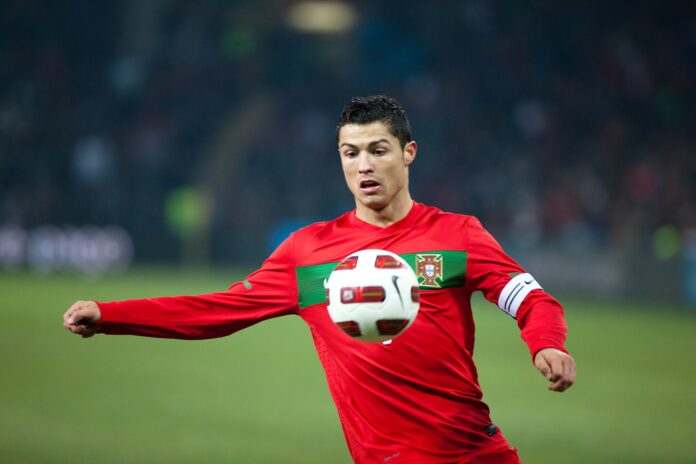
Footballers today are carving out space in the commercial world by building personal brands that carry value long after their boots are hung up. From stylised logos and fashion labels to commercial partnerships and digital ventures, players are thinking more like entrepreneurs than ever before.
In a crowded and highly scrutinised industry, developing a recognisable, consistent personal brand has become essential, not just for commercial deals, but for long-term relevance in sport, business, and culture.
Turning identity into a brand
For many players, the foundation of a personal brand begins with something simple: a nickname, a number, a distinctive playing style, or even their initials. Over time, this gets formalised into logos, trademarks, companies, and full-scale branding strategies.
Cristiano Ronaldo’s CR7 brand, built on his initials and shirt number, has become a standalone empire, encompassing fashion, footwear, fragrances, hotels, and even a private jet.
Cristiano Ronaldo was one of the first to turn this concept into a global business. The CR7 brand, built on his initials and shirt number, has become a standalone empire, encompassing fashion, footwear, fragrances, hotels, and health clubs as well as appearing on his own private jet. It is one of the most commercially successful athlete brands in the world.
Lionel Messi, though less overt in his marketing style, also has a registered personal logo used across branded merchandise and advertising. His symbol, a stylised “M”, appears on his Adidas boots and other licensed products tied to his image.
Neymar Jr. has developed a recognisable brand with the NJR logo, used across his collaborations with Puma and Red Bull. The branding is supported by a strong digital and social media presence, with Neymar actively positioning himself in gaming, fashion, and lifestyle spaces.
Mesut Özil’s M10 identity represents more than just a shirt number. It’s become the face of various business projects, from esports to charity work and fashion lines. Özil’s brand extends especially well into the Middle East and Turkish markets, where he maintains strong cultural connections.
Jesse Lingard capitalised on his own identity with JLINGZ, a brand that originated from his hand gesture celebration. He turned that into a streetwear label and YouTube presence, helping him stay relevant even during periods of lower on-pitch visibility.
Kylian Mbappé, still early in his career, has worked closely with Nike to create personalised boot designs and campaigns that reflect his roots in Bondy, France. His brand strategy is rooted in heritage and ambition, appealing to younger fans globally.
Memphis Depay has taken a different approach. Through his “Memphis” brand, he has combined music, fashion, and social storytelling. He has built a crossover presence as a rapper and creative, aligning his personal brand with artistic expression and independence.
Why player branding matters
Developing a personal brand is about owning your own narrative, maximising commercial leverage, and ensuring long-term relevance beyond football. In a market saturated with talent, players who build a clear, authentic brand give themselves a serious competitive edge, both on and off the pitch.
Here’s how a strong personal brand creates tangible value:
1. Greater control over image rights
When a player has already developed a recognisable identity, complete with logos, media presence, and commercial clarity, they’re in a stronger position to negotiate how their image is used. Instead of simply handing over broad rights to a club or sponsor, a player with a defined personal brand can license specific assets, limit usage terms, and protect the value of their likeness. This is especially important in negotiations involving shirt sales, digital avatars (like in EA FC), and branded content. Athletes like Ronaldo and Messi have entire legal teams built around protecting and commercialising their image rights globally.
2. Launching independent business ventures
A recognisable brand becomes the foundation for launching products, services, or media platforms. Players like Jesse Lingard (JLINGZ) and Marcus Rashford (via his publishing and social advocacy work) have used their personal brands to create businesses that function independently of their football careers. Whether it’s streetwear, digital content, fitness apps, or production companies, the personal brand acts as the engine that powers these ventures and builds customer trust.
3. Securing long-term brand partnerships
Brands are more willing to offer long-term ambassadorships to players who embody consistent values and messaging. A player who stands for more than just performance, whether that’s authenticity, style, community, or activism, is more likely to form meaningful relationships with commercial partners. These partnerships often go beyond one-off endorsements, evolving into multi-year campaigns, equity stakes, or collaborative product lines (like Paul Pogba’s Adidas capsule collections or Hector Bellerín’s sustainability-focused work with eco-brands).
4. Building a post-career platform
Football careers are short. A strong personal brand ensures that the spotlight doesn’t fade when the boots come off. Players who have positioned themselves clearly, with a voice, a style, and a following — are more likely to transition into media, entrepreneurship, philanthropy, coaching, or public speaking. Think of Gary Neville’s work in broadcasting and business, or Megan Rapinoe’s transition into advocacy and corporate boardrooms. Their personal brand provided a clear lane to move into after retirement.
5. Direct-to-fan engagement
With social media and content platforms, players no longer need to rely on intermediaries to reach audiences. A well-managed brand allows players to speak directly to their fans, through YouTube channels, podcast appearances, Instagram content, or newsletters. This not only builds loyalty and relevance, but also creates direct monetisation opportunities via sponsored content, product drops, or subscription models. Players like Theo Hernandez, Reece James, and Alphonso Davies have all invested in content production that supports their branding strategy.
6. Standing out in a crowded market
Every season brings hundreds of new professionals into the game. Brands aren’t just looking for talent, they’re looking for alignment. When evaluating potential partnerships, companies ask:
- What does this player stand for?
- Do they reflect the lifestyle or values of our target market?
- Can they communicate effectively across digital platforms?
- Will they add credibility or risk?
A well-defined personal brand answers those questions instantly. It helps brands cut through the noise and identify ambassadors who are trusted, influential, and strategically aligned.
A well-defined personal brand answers those questions instantly.
What makes a brand work?
The most effective personal brands in football are built on three core pillars:
Authenticity
The branding must reflect who the player truly is. Fans and consumers can quickly spot when something feels forced or disconnected from the athlete’s real personality or story.
Consistency
From visual design (logos, fonts, colours) to messaging and public appearances, successful player brands maintain a clear identity across platforms and campaigns.
Narrative
Every strong brand tells a story. Whether it’s Cristiano Ronaldo’s journey from Madeira to global icon, or Mbappé’s rise from Bondy to the World Cup, these stories create emotional connection and commercial power.
Final thought
In today’s game, talent on the pitch is only part of the equation. Off the pitch, players who invest in building a strong, consistent personal brand are securing long-term influence, income, and cultural relevance.
As the next generation of players comes through, we’re likely to see more logos, more business ventures, and more athletes behaving like CEOs. Footballers aren’t just chasing goals — they’re building brands that can last a lifetime.
Footballers aren’t just chasing goals — they’re building brands that can last a lifetime.



